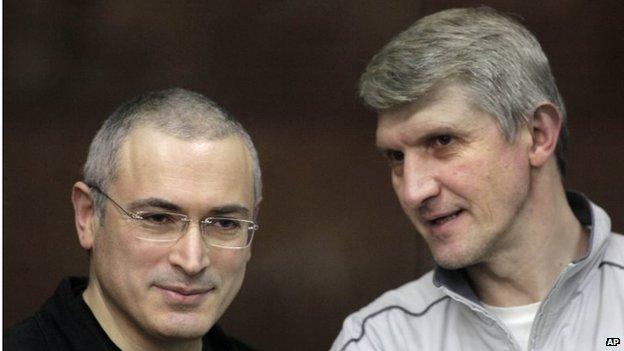Russia frees Khodorkovsky ex-partner Lebedev
- Published

Platon Lebedev (right) and Mikhail Khodorkovsky were convicted of tax evasion and theft
Platon Lebedev, the ex-business partner of Mikhail Khodorkovsky, has been released after spending 10 years in jail in Russia, officials say.
Lebedev was due for release in May, but the Supreme Court on Thursday reduced his sentence.
Lebedev and Khodorkovsky were convicted of tax evasion and theft after funding opposition parties and falling out with President Vladimir Putin.
Mr Putin pardoned Khodorkovsky last month. Lebedev did not seek a pardon.
Improving image?
Lebedev left the Velskaya prison in the northern Arkhangelsk region at about 22:00 local time (18:00 GMT) on Friday, a prison service spokesman was quoted as saying by Russia's Ria Novosti.
Lebedev was allowed to leave after the prison received a copy of the Supreme Court's ruling.
Both men's convictions remain in place, despite repeated appeals.
On Thursday, Supreme Court Judge Pyotr Serkov declared in the ruling, "Release Lebedev", after reducing his sentence so that it amounted to time served.
But he did not change a court order under which Lebedev and Khodorkovsky had to pay 17bn roubles ($500m; £300m) in tax arrears.
That debt is an obstacle to Khodorkovsky returning to Russia. He left for Germany in December.
The releases are believed by many to be part of a drive to improve Russia's international image ahead of the Sochi Winter Olympics next month.
Among other prominent inmates freed in the past few weeks were two women from the Pussy Riot protest group, jailed over the performance of a "punk prayer" critical of Putin in a Russian Orthodox church.
Lebedev used to head NFO Menatep, while Khodorkovsky ran oil giant Yukos and was once Russia's richest man.
Both men were regarded by human rights groups as political prisoners but the Kremlin has denied using the courts for political purposes.
They were arrested in 2003 and convicted in 2005 and then again in 2010.
- Published22 December 2013
- Published20 December 2013
- Published23 December 2013